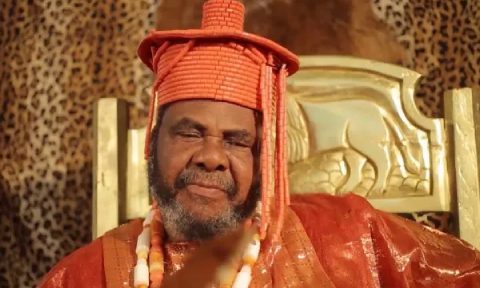
While piracy accounts for almost 7% of all global trade, Nigeria accounts for 80% of the pirated international music CDs. In this illustrative essay, Michael Dibie captures the damaging effect of piracy on global trade.
Nigeria’s status as a favourable destination for foreign direct investment as well as a place where local creative talent can flourish is in jeopardy. No thanks to the activities of criminals that place no value on intellectual property (IP). That was the alarming message from a panel of experts who debated the enforcement of IP rights at the opening day of the CTO business and technology summit in Lagos recently.
The summit was organized by the US Mission to Nigeria and sponsored by leading technology organisations, including the Business Software Alliance (BSA) – an industry body that represents commercial software developers and other computer companies and software developer Microsoft. It brought together luminaries from the public, private, government and commercial sectors of local and international industry. “We need to focus on getting the economic and legal fundamental right in Nigeria in order to open the door to prosperity and growth,” said Brian Browne, the US Consul General, in his keynote address.
“When it comes to the abuse of intellectual property rights, everyone suffers – the person in the street, leaders of businesses, international trading partners and the Nigerian economy as a whole. We still have a major problem with counterfeit goods of all kinds here in the country.
“Theft of IP deprives Nigerian professionals of the revenue they have rightly earned and the government of the taxes that can be derived from that revenue reinvest in the economy”.
Karen Burress, a US Department of Commerce Representative visiting from Washington D.C., pointed out that counterfeit goods including music, movies, electronic goods, food stuffs, automotive parts and pharmaceuticals, among many other things account for seven per cent of all global trade. This equated to almost $350 billion in lost revenues and millions of jobs gone worldwide.
“We estimate that Nigeria is the largest market in Africa for goods that infringe IP rights. Around 80% of the international music CDs available here are pirated; even the local music industry sees 40% of its products being copied, counterfeited or sold illegally,” she said.
At a recent joint operation by the Standards Organisation of Nigeria (SON), the Copyright Commission and Performing Musicians Association of Nigeria (PMAN) in Lagos, pirated local and foreign musical compact discs and video CDs worth over N15million were confisticated by the agencies, which acted on a tip-off.
Former PMAN President, Mr. Charles Oputa, (a.k.a. Charly Boy) and former director-general of the NCC, Mr. Adebambo Adewopo and director-general of SON, Dr. John Akanya, disclosed that operatives of the regulatory agencies are still interrogating the arrested Chinese owners of the company of the pirated materials, who will soon face prosecution. Meanwhile, the impounded pirated musical products are now in the custody of the SON, pending their public destruction by burning by the inter-agency operations team.
The question therefore remains: what can be done? Gerald Ilukwe, the Regional Manager for Microsoft in Nigeria and Ghana, said after the event that a combination of awareness creation and legal enforcement is the most effective method.
Recently, the Nigeria Copyright Commission (NCC) got a rare pat on the back when the United States removed Nigeria from the Special 301 Lists of countries blacklisted for condoning intellectual property theft in recognition of the renewed battle against the increasing spate of piracy and counterfeiting.
The Special 301 is a Federal law that defines the US measures against countries identified as denying effective protection for intellectual property.
Despite the renewed vim brought in the fight against piracy in the country, intellectual property theft is still rampant. But the good tiding is that at least, Nigeria has started the battle and the challenge is really how to minimise to the barest minimum, if not uproot, this cankerworm which undermines the creative enterprise of the artistes, writers and other creators of intellectual works who are being denied the fruits of their intellect.
The creative industry has been at the receiving end of piracy over the years. Book publishing which used to be a vital aspect of the economy has been greatly affected as many authors have suffered huge losses with the bookstands awash with fake copies of their works. In fact, piracy in Nigeria has become a highly organised crime and a huge industry involving both locals and foreigners that controlled the bulk of both production and distribution channels of copyright works. Piracy thrives more in the entertainment industry where the production and distribution capacity of all genre of works are daily being undermined . The home video and music producers have suffered huge losses to piracy. What is today the success story of Nollywood is indeed in spite of the pirates. Musicians still depend heavily on road shows to capitalise on their popular numbers as against the meager amount of royalty from compact disc sales.
While we welcome the Strategic Action Against Piracy (STRAP) initiated by the Adebambo Adewepo – led NCC as a deliberate public-private sector collaborative platform for copyright protection and effective anti-piracy measures, we believe this synergy can be more effective if all stakeholders give more attention to enforcement while sustaining its public enlightenment programme. Closer monitoring of replicating plants in the country is essential as many of these plants thrive on the illicit replication of works of foreign and local artistes, while still useful for legitimate business. The fulcrum of this cooperation should also extend to funding collaboration as government cannot fund the fight alone. Come to think of it, the private individual is the main beneficiary of the success in the anti-piracy crusade.
Piracy in Nigeria is so bad that the local music industry has actually called for a ban on the importation of music CDs.But Nigeria’s problems are sadly just taking root in a more serious way, as Nigeria exports pirate products to other parts of Africa. In particular, IIPA is aware of 15 optical disc factories that have been operational in Nigeria, having at least 52 lines, capable of producing at least 182 million discs (a conservative estimate). Some of these plants are owned by Asian companies displaced by enforcement against them in Asia. Reports from neighboring countries suggest that large quantities of pirate discs are being exported from these plants in Nigeria across the region. As such, Nigeria has unfortunately earned the dubious distinction of becoming an optical disc piracy hotspot, and IIPA called on the U.S. government to urge the Nigerian government to deal with this problem as an urgent matter.
Two of these plants (Akina and Nasinma) were raided in June and July 2004, and were raided again in 2006. However, to date, there has been no outcome with respect to actions against these plants. This massive over-capacity, plus pirate imports, resulted in pirate production not only for domestic consumption, but also for export (or “take out” as it is called, as people come from all over West Africa to buy pirated discs from Alaba International Market in Lagos). Pirated product from Nigeria has been found in Algeria, Senegal, Ghana, Zambia and South Africa.
Nigeria is a very large potential market, but the country is overrun with pirate materials domestically. Pirated CD-Rs containing copyright materials, for example, compilations of up to 300 songs by local and international artists, are being sold for less than the equivalent of US$ in the local market. There has also been a recent influx of imported piratedCDs from unknown locations in Asia.
Book piracy has been a big problem and continues to be a serious problem in Nigeria. This is in view of the Nigerian government’s decision in 2003 to cut all funding for university and library purchases. This decision has invariably created a climate fostering illegal photocopying, which plagues the academic market. Furthermore, Nigeria has for years been a destination for pirate book imports, primarily from Asia (China and Malaysia). Customs authorities should increase vigilance in seizing pirate products before it saturates the local market.
There are disturbing trends in terms of the level of violence associated with piratical activities in Nigeria. In June 2006, Nigerian police raided the Alaba International Market in Lagos, during which pirates shot two police officers, burned a police vehicle, and threw stones and bottles, injuring the industry coordinator when he was struck on the head by a stone.Tear gas had to be used to quell the violence. Several thousand pirate CDs and VCDs were seized and four men were arrested. This raid demonstrated the serious criminal nature of pirate enterprise in Nigeria and that a coordinated approach focused on criminal enforcement must be mounted.
According to Dr. Adebambo Adewopo, given that STRAP is now in place, the NCC can exercise its authority to the full extent of the law.
Responding to the suggestion that software companies should be more lenient regarding IP or that piracy is acceptable given that developers make huge revenues from the products. The same is true in the consumer market. People wouldn’t walk into a supermarket, fill their trolley and walk out without paying because they felt the retailer made too much money. They wouldn’t steal or buy a stolen car just because they thought the prices were too high. Why is it less of an offence if people do this with computer software, music CDs or DVDs?
“It’s often said that software is too expensive. However, a huge amount of revenue is channeled back into the research and development of products that help people do business – the very same people that are complaining about paying for the software.
The commission must, thus put in place the enabling structures and systems necessary to make the works of the creative artistes profitable. It also behooves practitioners and players in the industry to play by the rules to conform to international best practices.
While such initiatives as the Copyright Notification, Video Rental and Hologram Schemes as well as the Optical Disc Regulation are geared towards this end, the Commission needs to act to curtail the incidence of broadcast piracy which equally robs many artistes of their legitimate entitlements. The NCC should therefore resolve all the nagging issues in collective administration, in the music sub-sector in the best interest of rights owners and creators in the industry. Two bodies, the Performing and Mechanical Rights Society (PMRS) and the Musical Copyright Society of Nigeria (MSCN) have been in the fore of this campaign.
But more importantly, we believe, that an amendment to the Copyright Act to provide stiffer penalties to serve as a deterrent to pirates is long overdue. Piracy has become a serious problem that is injurious to the economy. The defence of intellectual property demands drastic action against piracy.



















